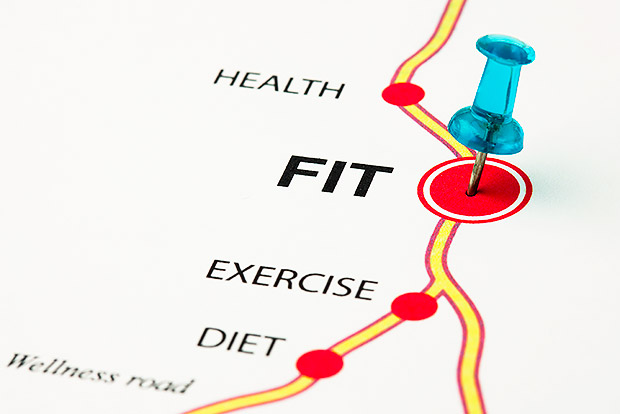
Maintaining a healthy body weight is important, but it should not be confused with being physically fit. Simply being thin does not protect you from health conditions related to a sedentary lifestyle.
Research supports fitness.
A person can appear thin while having excess visceral fat (the fat around vital organs that increases disease risk), which makes weight by itself a poor indicator of overall health. Researchers use the term metabolically fit to describe a person who is a regular exerciser and overweight, but is without health risk factors, such as high cholesterol or high blood pressure. Studies show that, despite being overweight, the metabolically fit have no higher death risk than those who are fit and maintain a normal weight.
This research indicates that thinness doesn’t always equal fitness, but this is no reason to abandon your weight loss goals. Maintaining a healthy weight puts less stress on your bones and joints and can improve your energy levels.
Measure your fitness.
Fitness should be your goal regardless of your body weight. There are three components that define your total fitness level:
Cardiorespiratory endurance – Often measured by the step test. It is the ability of the heart, lungs, and vascular system to work together to transfer oxygen and carbon dioxide within the body during activity.
Muscular endurance, power, and strength – Often measured by push-up tests, sit-up tests, and handgrip. It is the ability of the muscles to contract, generate force, and sustain repeated contraction.
Flexibility – Often measured by the sit-and-reach test. Flexibility is a measure of the range of motion around joints.
Fitness centers, worksite health fairs, and university exercise labs provide tests for these components.
Pass these health tests.
Health tests help you identify risk factors for heart disease, diabetes, and some cancers. Remember that those considered metabolically fit do not have health risk factors despite the fact that they are overweight according to their BMI. Regularly schedule appointments with your healthcare provider to assess these health indicators. He or she may recommend more tests to determine your overall health status.
- Fasting blood glucose - 70 to 100 mg/dL is normal
- Triglycerides - below 150 mg/dL is desirable
- HDL cholesterol - greater than 60 mg/dL is desirable
- Blood pressure - less than 120 mmHg over less than 80 mmHg is normal
Exercise regardless of your weight.
Exercise is a key factor in staying metabolically fit. The American College of Sports Medicine recommends that adults get at least 150 minutes of moderate-intensity exercise each week for improved health. In addition to cardio workouts, incorporate two or three days of strength training and two or three days of flexibility training each week for a balanced exercise program to improve your metabolic fitness.



 4 Tips for Healthy Office Meetings
4 Tips for Healthy Office Meetings
 11 Healthy Distractions to Help You Stop Snacking
11 Healthy Distractions to Help You Stop Snacking
 6 Tips for Hosting a Healthy Party
6 Tips for Hosting a Healthy Party
 10 Ways to Cut 100 Calories (or more!)
10 Ways to Cut 100 Calories (or more!)
 8 Ways to Celebrate Your Weight Loss
8 Ways to Celebrate Your Weight Loss
 Healthy Changes You Can Make in Minutes
Healthy Changes You Can Make in Minutes
 6 Grocery Shopping Mistakes
6 Grocery Shopping Mistakes
 Tips to Prevent High Blood Pressure
Tips to Prevent High Blood Pressure

 Pinterest
Pinterest RSS Feed
RSS Feed